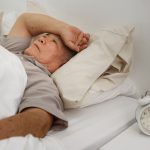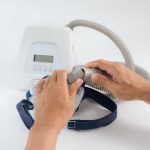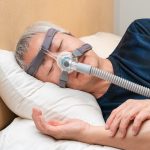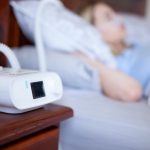The Emotional Turbulence of OSA: How Sleep Apnea Affects Mood and Mental Health
Posted by Dr. Michael Breus

We talk a lot about the physical health risks associated with untreated sleep apnea—with good reason. Cardiovascular disease, diabetes, cancer, accident and injury, dementia and other neurodegenerative diseases are among the many serious conditions for which sleep apnea elevates risk.
But sleep apnea left untreated takes a significant toll on mental health, too. OSA often contributes to complex and debilitating problems with psychological well-being, interrupting daily functioning, elevating mortality risk, depriving patients of joy, pleasure, energy and vitality, and a sense of meaning and purpose in their lives.
Awareness about the mental health risks linked to sleep apnea has grown tremendously over the years. Still, I encounter many patients—and many physicians—who don’t understand the close relationship between undiagnosed and untreated sleep apnea and psychological illness. That leaves people with OSA even more isolated and vulnerable to the pain and suffering that comes from psychological distress. With awareness, attention and the appropriate therapies, both sleep apnea and its related mental health challenges can improve, and life can start to look and feel normal again. Let’s dig in for a closer examination of this complicated, important relationship.
How sleep apnea affects mental health
OSA is a disorder of sleep-disrupted breathing. Its hallmark symptom is the diminishment or interruption of breath caused by muscles in the upper airway collapsing during sleep. How does a sleep breathing disorder result in psychological upheaval and dysfunction?
The answer to that question is incredibly complex, and one scientists are still working to unravel. There are likely a number of co-occurring factors involved.
There are four main ways OSA creates physiological stress that leads to psychological problems
When breathing is impaired during sleep, the body is deprived of sufficient oxygen, and of sound rest. Oxygen deprivation and sleep disruption itself launch a series of physiological reactions that eventually will interfere with psychological well-being.
#1 OSA-induced stress increases cortisol
Levels of cortisol are typically elevated in people with obstructive sleep apnea. Cortisol is a primary stress hormone, and a key driver of the body’s fight or flight response. Chronically high cortisol creates a near-constant state of arousal, leading to less sleep and considerable stress on the body. Elevated cortisol is linked to mood disorders, including anxiety and depression.
#2 Stress from sleep apnea can disrupt “feel good” hormones including dopamine and serotonin
Chronic physiological stress and elevated cortisol are catalysts for problems with other hormones and neurotransmitters that are important in regulating mood, maintaining psychological balance, and processing emotions. Overproduction of cortisol can disrupt the body’s dopamine system and reduce levels of dopamine, a key player in the brain’s reward system. Dopamine is the neurotransmitter that delivers the pleasure response in the brain. Dopamine is intricately linked to our motivation, ability to feel excited and purposeful about things that matter to us. Dysfunction of the brain’s dopamine system is linked to depression and to other mental health conditions including bi-polar disorder and schizophrenia, as well as to ADHD.
#3 Stress and high cortisol also lower levels of available serotonin
Low serotonin is linked to anxiety as well as bi-polar disorder and OCD. The relationship between serotonin and depression is particularly complex. Scientists once thought that insufficient serotonin was a direct cause of depression. Research in recent years suggests that lack of serotonin on its own does not directly cause depression. Nevertheless, a frequently used class of antidepressant medications, known as SSRIs, work by elevating serotonin. These medications don’t work for everyone with depression. They’re effective in somewhere between 40-60% of cases. Making more serotonin available to the brain can, in these cases, provide relief from depression symptoms. And serotonin is involved in a number of processes that affect depression indirectly. It’s a neurotransmitter that helps to facilitate emotional processing. And serotonin is what’s known as a precursor to the sleep hormone melatonin. The body must have sufficient serotonin to produce melatonin, and a lack of serotonin can cause poor quality and insufficient sleep.
#4 Stress changes the functioning and structure of the brain’s emotional centers
Physiological stress and its related hormones, including cortisol, alter how the brain operates in regions important to mood and emotion. Stress also can create changes to the physical structure of these regions. Stress appears to inhibit production of new nerve cells in the brain, hindering the communication and processing work that’s necessary for the brain to regulate mood and maintain emotional balance.
In particular, stress creates hyperactivity in the amygdala, the brain’s emotional rapid response center. Prolonged physiological stress also can increase the size of the amygdala. The amygdala plays a critical role in our ability to feel all sort of emotions, but it’s most closely associated with our fear response, and our emotional reactions to experiences our brain perceives as potentially threatening. An overactive amygdala creates the conditions for emotional reactivity and volatility, as well as anxiety and low mood. Stress-induced changes to the amygdala are factors in mood disorders, including depression and anxiety.
At the same time physiological stress is ramping up activity in the amygdala, stress inhibits function in other regions of the brain that process memories, emotions, and sensory information, regulate behavior, and facilitate learning. These stress-sensitive regions include the thalamus, hippocampus, and prefrontal cortex. Dysfunction in these areas of the brain is associated with depression, anxiety, or other mental health conditions.
OSA hinders emotionally-restorative sleep
In addition to the physiological changes that disrupted breathing, oxygen deprivation, and fragmented sleep can cause, the loss of time spent in sleep itself can impact mood and psychological health. Sleep architecture is made up of cycles of sleep composed of five distinct stages. There are four stages of non-REM sleep, including both light sleep and deep, slow wave sleep, along with REM sleep. A typical 7-8 hour night of sound sleep contains 4-5 complete sleep cycles. Each sleep cycle is different. We spend more time in non-REM sleep during the first half of the night, and more time in REM sleep as the night progresses. Every individual sleep stage matters to mental health. Non-REM deep sleep enables the body to repair the cells and tissues belonging to systems that control stress, including the immune system and the brain. And sleep itself is a time for the brain to do the work of processing emotions, including taking freshly-lived experiences and reworking them into settled, stable, less emotionally-charged memories. Scientists consider REM sleep a critically important stage of sleep for this emotional processing. When sleep is chronically disrupted via sleep apnea, we lose the opportunity to do this important work to maintain psychological balance, leaving us more vulnerable to mental health issues.
Mental health conditions linked to sleep apnea
Now that we’ve established some understanding of the ways OSA can disrupt psychological health, let’s take a look at specific conditions that occur alongside untreated sleep apnea, and how treating OSA can help restore mental health along with more restful sleep.
Depression and OSA
Depression is common among people with sleep apnea. Research estimates that more than 20% of people with OSA have clinical depression. And studies suggest that OSA is present in more than a third of people with major depressive disorder. A large-scale study conducted in 2017 used data from more than 250,000 adults in the United States and determined that people with sleep apnea have more than 3 times the risk for depression than people without the sleep disorder.
Obstructive sleep apnea and depression share many of the same symptoms, including restless sleep, fatigue, difficulty with focus, persistent feelings of frustration and helplessness, anxiety and weight gain. This can complicate the diagnosis of both conditions. There’s also evidence that untreated OSA is a cause of treatment-resistant depression, which is exactly what it sounds like—depression that doesn’t improve with treatment.
CPAP is the first-line treatment for OSA, and a body of scientific research shows that using CPAP for OSA can improve co-occurring depression symptoms. That said, depression that occurs with sleep apnea may not fully resolve with OSA therapy, and may require additional treatment. It’s essential to speak with your physician about the full range of your symptoms, including those that overlap with depression. And it’s critical that physicians pursue treatments that address both sleep apnea and depression, including depression treatment that goes beyond treating OSA directly.
Anxiety and OSA
Anxiety can be a symptom of depression in conjunction with sleep apnea. It also exists on its own alongside OSA. Lack of sleep, physiological stress and chronically elevated stress hormones, and a persistent state of arousal all contribute to anxiety in people with untreated sleep apnea. This 2014 study found anxiety symptoms present in more than half of people diagnosed with OSA. And when sleep apnea was more severe, so was anxiety.
The large-scale 2017 study in the US found the risk for anxiety in people with OSA is 3.68 times higher than in people without sleep apnea. That study also showed people with OSA more likely to report feeling that their mental health needs were not being met with enough attention by their doctors and health care systems, suggesting many people are living with OSA-related anxiety and other mental health disorders without the support and treatment they need. As with depression, research shows CPAP can improve anxiety symptoms in people with OSA.
Claustrophobia and OSA
Claustrophobia is an anxiety disorder that has particular relevance for OSA and its treatment. Relatively under-studied in relation to sleep apnea, it is nevertheless an important anxiety issue to address in connection with sleep apnea and CPAP treatment. Claustrophobia involves fear of small and enclosed spaces, and also fears of suffocation, and restrictions on breathing. There’s evidence that people with OSA experience greater anxiety around suffocating and choking, especially when OSA is severe. That’s not at all surprising, considering the repeated interruptions to their breath during sleep, which can create a choking response as a person struggles to resume breathing and catch a full breath.
At the same time, claustrophobia can interfere with effective CPAP treatment. Many of my patients with sleep apnea who are just beginning their CPAP therapy feel a lot of anxiety about wearing a mask over their nose and mouth at night. They’re afraid they won’t be able to breathe. Panic attacks at the start of CPAP are not uncommon. Most of my patients first become aware of their claustrophobic sensitivity when they first start using CPAP.
A 2015 study found claustrophobic tendencies present in 63% of OSA patients. That study also found that this anxiety made it harder for people to use CPAP consistently and as needed to get its full benefits.
The beginning of CPAP treatment is typically when this anxiety is most intense. It’s a normal, natural, common response, and one that can be overcome with some attention and awareness. The use of vented masks, time spent wearing CPAP masks during the day to practice relaxed breathing are a couple of ways to alleviate concerns about restrictions to natural breath. I often find that the most powerful tool in easing claustrophobic tendencies around CPAP involves patients cultivating an awareness of where the risks of breathing restriction really lay: It’s sleep apnea that’s the cause of breathing problems, and that CPAP is the tool that will solve these breathing problems and allow a fuller, safer, more natural breath during sleep.
OSA and other mental health disorders
OSA is also linked to elevated risk for other forms of psychological dysfunction, including psychosis, schizophrenia, and bi-polar disorder. As is the case with depression and anxiety, these are complex psychological conditions that typically emerge as the result of many factors, of which OSA may be just one. Nevertheless, the prevalence of OSA in people with these conditions is significantly higher than in the general population. And it’s important to note that some medications used to treat these disorders can aggravate symptoms of OSA. People with these conditions should be screened for sleep apnea, so their sleep disorders can be treated effectively in conjunction with their mental health conditions.
The emotional and psychological impact of untreated sleep apnea can be debilitating, compounding the stress and exhaustion that comes from disrupted sleep breathing and poor sleep. Left untreated, it’s a difficult cycle that escalates. Treatment breaks that cycle and puts people on a path to restoring not only sleep but emotional balance and robust mental health.
Sweet Dreams,
Michael J. Breus, PhD, DABSM
The Sleep Doctor™
www.thesleepdoctor.com












